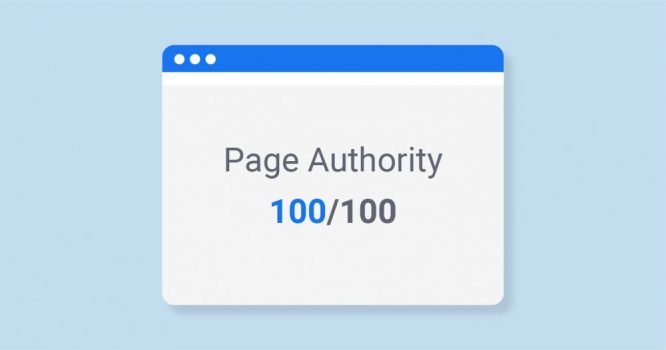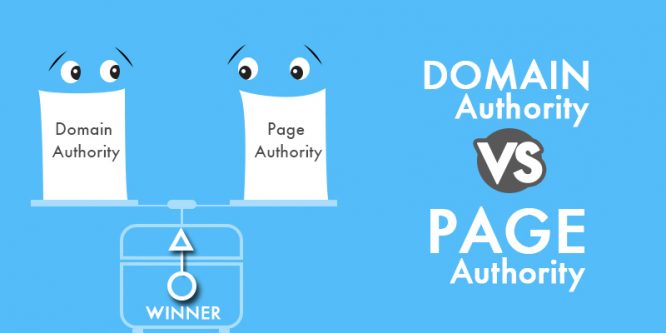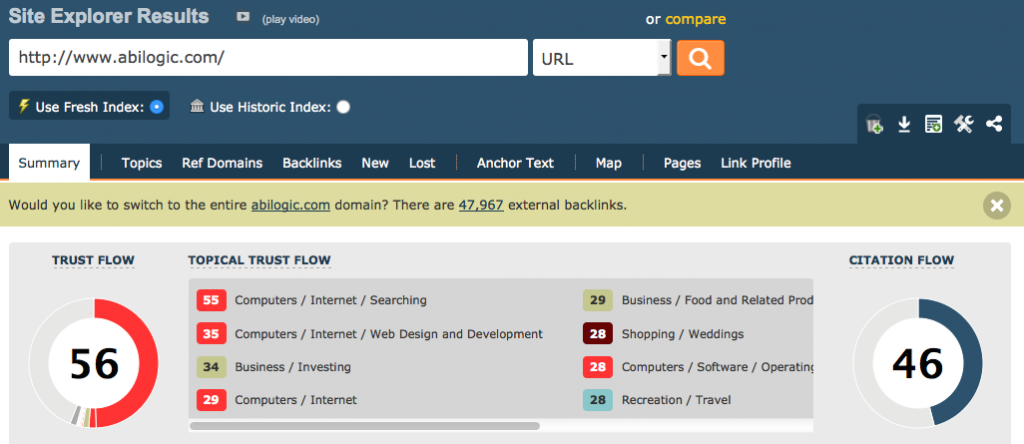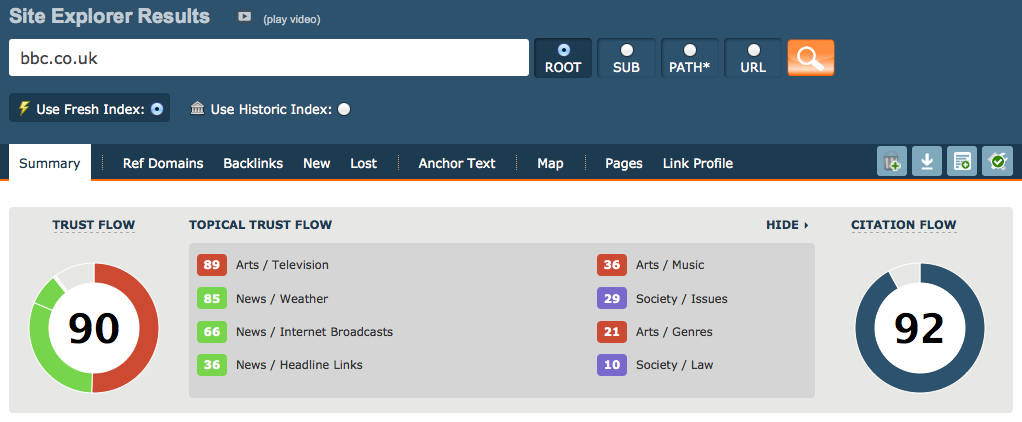Whenever you want to optimize a website for better rankings in search engines or want to improve its SERP performance, four things that are most likely to crop up with your research are Page Authority, Domain Authority, Trust Flow, and Citation Flow. In fact, these factors are often called as four pillars of SEO and are very essential if you want to properly optimize your webpages or websites for better performance in search results.
For a better understanding of these terms and what they really mean, let us dig little deeper into each of these terms.
Page Authority

Page Authority is basically a score developed by MOZ (a search engine optimization company) to determine how well a page can rank in the search results. The score ranges from 1 to 100, where higher the number, the better are the chances for higher rankings.
Scoring process takes several factors into consideration like backlinks, domain authority, etc.… Lower score doesn’t necessarily mean your pages will rank lower and vice versa. Ranking of your page will depend on the relative score. For example, if a page with authority score of 40 ranks number one for the query “Professional Tennis bats” then there is a high chance that your page with a page authority score of 50 will take over the position.
Obviously, very competitive search terms will have high authority pages with very high scores occupying the top 10 spots in the search results. On the contrary, less competitive terms are more likely to have pages with low authority scores, making it relatively easier to rank your pages.
What is a Good Page Authority Score?
Like mentioned earlier, there is no fixed good page authority score. If you have a page with an authority score of 90 and your competitor’s pages have an authority score of over 95 it is still considered a bad score. On the contrary, if your competitor’s pages have an authority score of 20 and your page has a score of 25, though it is low, it is still considered as a good score. As the authority score is a relative measure, there is no fixed good or bad page authority score.
What is the difference between Page Authority and Domain Authority?
Like the name suggest, page authority is a measure of ranking strength or authority score of a single web page or URL. Domain authority, on the other hand, is the measure of ranking strength of the whole domain, subdomains and the pages in it. Although there are basic differences between the two, the algorithm or metrics used to calculate these scores are similar to one another.
Is Page Authority Score a Constant?
No, the metrics used to calculate the score goes through changes from time to time-based on algorithm updates from search engines like Google. With these changes in place, the page authority score also goes through changes from time to time.
Where to check the Page Authority Score?
Moz’s page authority metrics is incorporated in several SEO tools on the web. If you want to check authentic page authority score then you need to sign up for a free account with MOZ here and by using MOZBar on your browser which can be downloaded from here.
Domain Authority

Domain authority is in many ways similar to that of page authority except that this metric takes the entire domain and subdomain and all the pages on the website into account. This means an individual page in a domain can have a higher or lower authority score than its parent domain.
Domain authority score also ranges from 1 to 100, where 1 is usually a default score of a new domain. DA scores are usually high for websites like Facebook, Amazon, Wikipedia, and other well-established sites. So, the key goal is not to compete against the big players but rather to compete against sites that are similar in scale to yours.
DA scores will vary from time to time for your websites. This happens mainly due to the changes and updates in the Google search algorithm. Again, big players like Wikipedia, Amazon, Facebook are usually untouched by these changes.
How to increase your domain authority score?
One of the best ways to boost your domain authority is by gathering more external links from other authoritative websites. More authentic links you build for your domain, more are the chances that your DA score will improve. However, domain authority metrics takes several factors into consideration and also takes the quality of the domain, and page linking your site matters a lot. In other words, spam links are usually considered bad.
Where can I check my domain authority score?
You can easily check your domain authority score using this free to use the online tool here.
Trust Flow and Citation Flow

Similar to page authority and domain authority score, trust flow, and citation flow are also scales that measure the quality of the links pointing to your website or a webpage.
Trust flow and citation flow scores are measured by Majestic (a popular search engine optimization company) which ranges from 0 to 100, where Google has a score of 99.
Citation Flow: This is in many ways similar to page authority; however, citation flow just considers the links and number of links that point to a particular webpage and calculates the score solely based on the number.

In other words, this score determines how influential a particular webpage or link is on the topic based on the number of external links pointing to it.
For example, say your website has one page called A, and your competitor has another website with one page called B. Let’s assume that your competitor’s page B has 100 external links pointing to it and your page A has 200 links pointing to it.
In this case, your page with a greater number of external links will have a higher Citation Flow score than your competitor’s.
That sounds simple, right? However, this is only a part of the story. In the past search engines merely calculated the number of external links pointing to a page and ranked a webpage based solely based on this metric.
This hidden trick was soon exploited as thousands if not millions of webmasters took advantage of this metric and started building links from poor quality websites, and online directories which led to poor quality search results.
Google soon turned up their game to patch up the problem and started tracking down sites that link to a particular webpage and started calculating the authority of the websites on the given topic.
This is where the trust flow comes into place.
Trust flow: This is a measure of how trustworthy a website that points to your webpage or link. In other words, it is a measure of the quality of the links that point to your webpage or domain.
Trust flow score usually carries more weight when compared to citation flow and search engines mostly agree with this.
After the abuse of search engine metrics that ranked webpages solely based on the number of external links pointing to it. Most search engines now started to analyze the quality of the links pointing to a particular webpage.
For example, imagine a scenario where your website with webpage A has 10 high-quality links from highly trusted websites, and your competitor with webpage B on the same topic has 100 external links from low quality and less trustable sites pointing to his webpage. In this scenario, though your competitor has a high citation flow score over yours, his webpage will still have a lower ranking because of a poor or low trust flow score in comparison.
Normally, sites with higher trust flow score have a higher citation flow score. However, a site with higher citation flow score need not have a higher trust flow score.
If your links have a good trust flow score over your competitors, then there is a very good chance that your webpage will rank higher.
However, links with higher citation flow score and low trust flow score are considered bad and may sometimes negatively impact your rankings.
This might sound unfair because you cannot really have full control over which websites link to your webpages. This loophole could very well be exploited by your competitors. But, search engines like Google have sophisticated algorithms in place to prevent these abuses.
To be fair, you need not have to really worry a lot about junk or low-quality links pointing to your webpages. Just focus on the high-quality links and more high-quality links you gather for your webpage, the higher is the chance for you to rank better.
What is the best ratio between Citation Flow and Trust Flow?
The ideal ratio between the two would be 1:1 however, achieving that ratio is next to impossible because you cannot fully control the external links pointing to your webpage. It is a good sign to search engines as long as you get near to the ideal ratio.
Where can I check the Citation Flow and Trust Flow Scores?
Like mentioned earlier Citation Flow and Trust Flow scores are trademarks of Majestic SEO. You can head to their website directly or use their browser extension.

